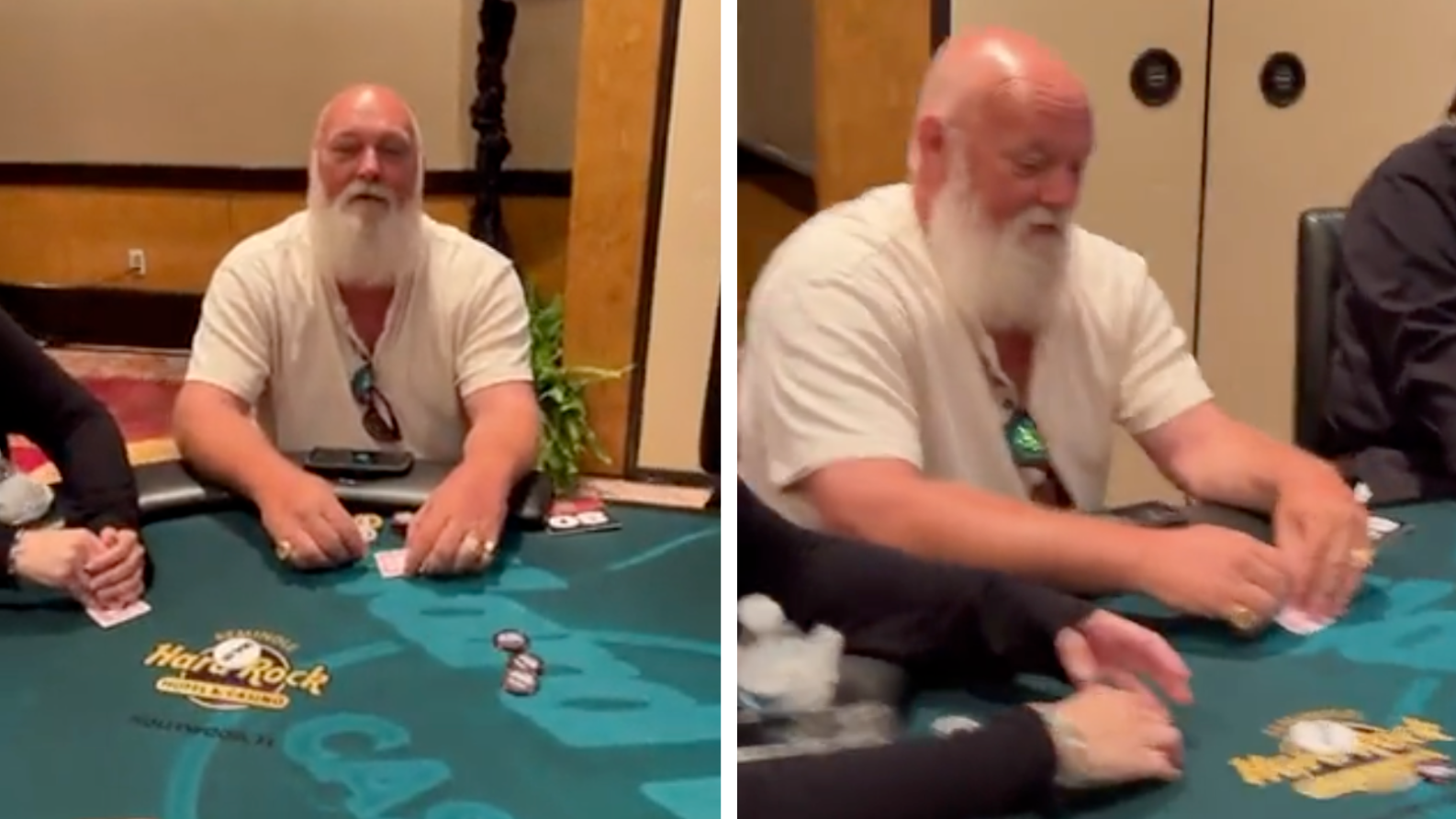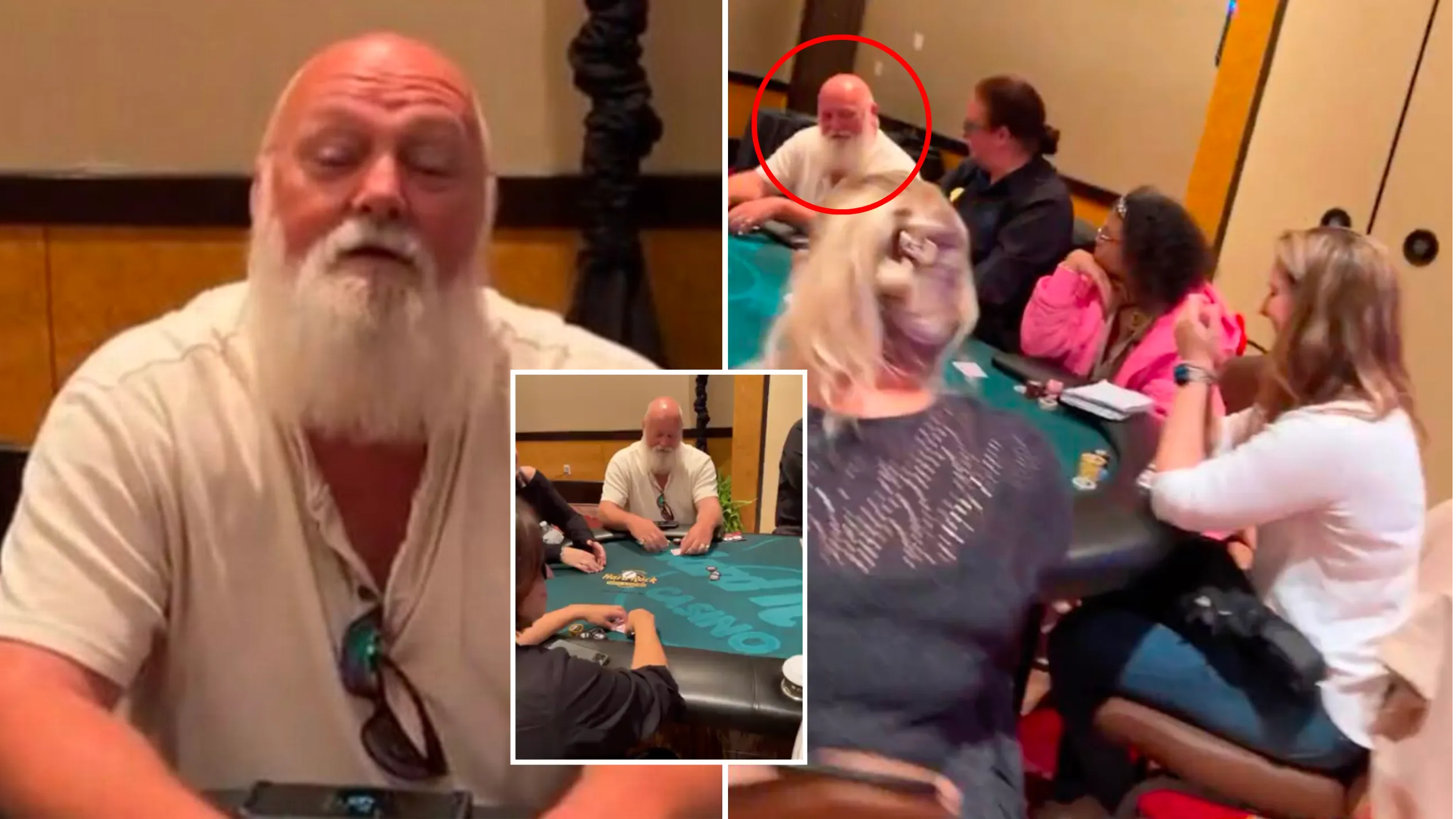Man Crashes Ladies Poker Tournament — Sparks Outrage With Controversial Win

The Unexpected Intruder
What was meant to be a celebration of women in poker quickly turned into one of the year’s most controversial headlines.
At the World Poker Tour’s $250 Ladies Event in Florida, 83 women sat down to play for a $17,400 prize pool. The air was light, competitive, and full of camaraderie. Ladies-only tournaments have long been seen as safe spaces, encouraging new players into a game that can feel overwhelming in male-dominated poker rooms.
And then Dave Hughes showed up.
A 70-year-old man from Florida, Dave Hughes entered the event because, as he later explained, it was the only tournament available for him that day. He had driven five hours from Orlando to visit a friend playing the $7 million Main Event at Seminole Hard Rock. When he discovered no other events were open, he decided to buy into the ladies-only event.
Legally, he couldn’t be stopped. And so, one man sat among 82 women, and the controversy was born.
Laws, Loopholes, and Unwritten Rules
Florida law — like Nevada, where the World Series of Poker is held — does not allow staff to deny men entry to women-only tournaments. To comply, these events are technically “open,” though they are promoted, structured, and intended for women.
Most men respect the spirit of the game and stay away. But history shows that some, whether for attention, ego, or money, do sit down. From Jose Canseco in 2007 to Abraham Korotki in 2009 and even a man in 2011 who dressed as a woman as a joke, there have been precedents.
But Dave’s entry in 2024 hit differently. Perhaps it was the optics. Perhaps it was the timing. Perhaps it was simply the sight of an elderly man busting young women from their own event. Whatever the reason, the outrage this time went viral.

A Bounty on His Head
As Dave settled into play, the pushback was immediate. Professional player Ebony Kenney, who entered the event, placed a $300 bounty on Dave’s head for whoever knocked him out. Others, including Tamara and her husband, matched it. Soon the bounty ballooned to over $2,100 — third-place prize money.
The irony was thick. The bounty meant players were chasing Dave harder, calling him lighter, trying desperately to eliminate him. But in poker, when opponents are chasing you, variance sometimes swings in your favor.
Dave leaned into the role of villain, even putting up $100 of his own money to add to the bounty. The situation became part comedy, part tragedy, part social commentary.
The Final Showdown
Despite the pressure and attention, Dave survived. Hand after hand, elimination after elimination, he held on. The crowd groaned each time another woman fell to him.
Finally, the tournament reached heads-up play. Dave held a staggering 6-to-1 chip advantage over Diana Siabeton. The bounty meant nothing now — he was one win away from the title.
The battle was brief. When the final card hit, Dave stood victorious. The 70-year-old man had just won a ladies-only event. He pocketed $5,555 for first place.

Dave Hughes
The Backlash
If Dave thought his win would be taken lightly, he was wrong. Social media erupted in anger. To many, his victory symbolized a breach of respect — a mockery of the event’s purpose.
Ebony Kenney called him out directly. Linda Johnson, the “First Lady of Poker” herself, warned that the bounty placed on him could backfire by giving men more incentive to enter. But even Johnson admitted that his participation undermined the very idea of creating safe, welcoming spaces for women.
Vanessa Kade, another outspoken pro, suggested reforms: allowing men to enter but giving them only a single chip, or making the ladies’ event invitation-only.
The debate raged. Should poker remain strictly open to all, or should some spaces be protected to encourage inclusivity?
Dave’s Defense
To his credit, Dave didn’t shy away. He explained his side with a mix of honesty and humor.
He had driven hours, wanted to play, and simply sat in the only game available. He said he respected the women, describing them as “fierce, capable, and competitive — and they smell a lot better than the men.” He admitted it was odd but maintained he did nothing wrong.
And legally, he was right. He had broken no rules. But morally, many argued, he had missed the point entirely.

History Repeats Itself
This wasn’t the first time women’s events had been compromised. The World Series of Poker itself had faced similar challenges. In 2013, organizers raised the buy-in for the Ladies Championship to $10,000 but gave women a $9,000 discount. This made it prohibitively expensive for men to enter while keeping it accessible for women.
It was a clever workaround, but not foolproof. In 2017, a man named Tony Roberto still bought in for the full $10,000 after losing a dare.
Women’s tournaments, though symbolic, serve an important role: encouraging women into poker. Walking into a room of 95% men is intimidating. Ladies events give new players confidence and community. Without them, many women might never return after their first experience.
The Deeper Issue
What Dave’s win highlights isn’t just one man’s decision to play. It shines a spotlight on poker’s ongoing struggle with inclusivity.
The numbers don’t lie: women represent less than 5% of fields in major tournaments. Stories of harassment and intimidation are far too common. For poker to grow, it must welcome diversity. Ladies events are one way of doing that.
So when a man takes that space, even legally, it feels like more than just a quirky footnote. It feels like a violation of trust.

The Aftermath
To soften the sting, the bounty money was awarded to second-place finisher Diana Siabeton. The crowd applauded her resilience. But the moment was bittersweet.
Dave left with his payout, perhaps proud, perhaps amused, perhaps oblivious to the storm brewing online. For the women, the day’s camaraderie had been overshadowed by controversy.
And for the poker world, a new debate was ignited.
Why This Story Matters
Poker has always balanced freedom with fairness. It’s an open game, a meritocracy, where anyone with the buy-in can sit down. But community matters, too. Spaces where women feel safe to play aren’t just symbolic — they’re essential to growing the game.
Dave’s win was legal. But was it right? That’s the question haunting poker today.
Conclusion: More Than a Game
The image of a 70-year-old man hoisting the trophy at a ladies’ event will linger — not because of the victory itself, but because of what it represents.
It was more than poker. It was about respect, inclusion, and the fragile trust between players. Until the game solves this tension, stories like Dave’s will keep resurfacing.
Because poker isn’t just about the cards. It’s about the people who play — and the spaces they’re allowed to call their own.





